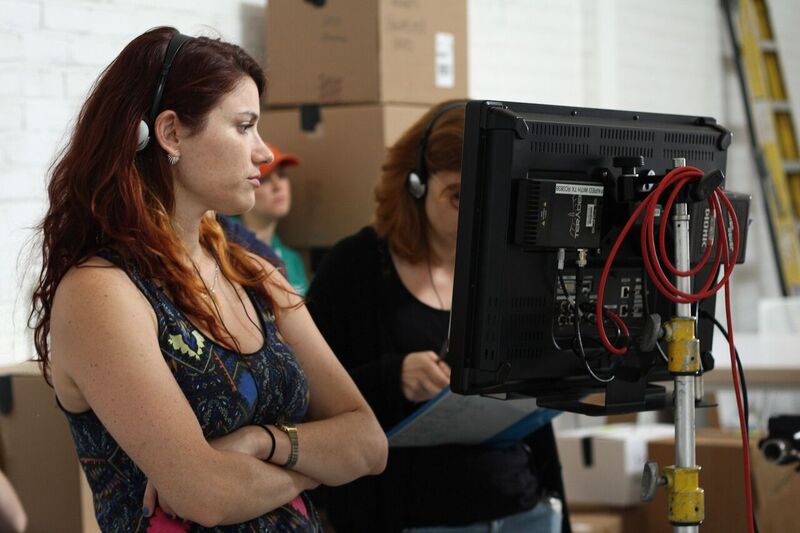Jessica Thompson.
Expat Australian writer-director Jessica M. Thompson was so tired of seeing films about the sexual assault of women being written by men that she decided to make her own.
Her debut feature The Light of the Moon won the audience choice award for best narrative feature at SXSW last year, where Amazon Prime Video snapped up the worldwide streaming rights.
The film stars Stephanie Beatriz as Bonnie, an architect who is sexually assaulted while walking home from an evening out with friends in Brooklyn. Initially she attempts to keep the assault a secret from her long-term boyfriend Matt (Michael Stahl-David) as she fights to regain normalcy and control of her life. But another attack in the neighbourhood drives her further into denial.
It will have its Australian premiere on the closing night of For Film’s Sake, the national flagship film festival for women formerly known as the WOW Film Festival, which runs from April 11-15 at multiple venues in Sydney including Event Cinemas in George Street.
The Brooklyn-based Thompson can’t attend as she is taking part in Big Vision Empty Wallet, a week-long development program in Costa Rica.
The director is the recipient of the festival’s inaugural Samantha Rebillet award for a first feature, which honours the legacy of the filmmaker who died in late 2017.
Festival director Sophie Mathisen said: “Sam was an incredibly important figure for a lot of female filmmakers, myself included. She opened doors, not only for herself, but others, selflessly and without question.
“This is an important acknowledgment of her spirit but crucially her talent in breaking boundaries and creating her work in the face of incredible resistance and disparity.”
Thompson tells IF: “It’s a great honour to be recognised in this way. Whilst I did not know Sam personally her example is one that has clearly influenced my trajectory.”
‘The Light of the Moon.’
She hopes the screening will attract the interest of Australian distributors who would be prepared to give the film a one-week cinema run.
It premiered on Amazon Video Direct’s Film Festival Stars program in the US on March 1 after a theatrical release late last year in 15 cities in the US and Canada, distributed by Imagination, a company run by women.
Amazon agreed to a hold-back in international territories to allow for theatrical deals; negotiations are underway with distributors in Europe and Latin America.
After moving to New York in 2010 she got the idea for the film when she learned that a friend had been sexually assaulted, which prompted her to wonder: How do you stay in an intimate relationship after that happens?
She said: “I had not seen that story before and I was sick of seeing narratives written by men.” Her firm Stedfast Productions raised the initial $US50,000 via crowd funding and the rest from private investors.
Thompson applied for Screen Australia funding at each stage of the process but was knocked back. “Screen Australia was not supportive,” she said. “One of the reasons I left Australia was that I was competing for funding with many of my peers. There is a lot of jealousy between filmmakers in Australia.”
Seeing more opportunities in the US, she quickly found her feet, working as a film editor with Academy Award-nominated filmmakers Liz Garbus and Edet Belzberg. She also edited Cheryl Furjanic’s documentary Back on Board: Greg Louganis, which was nominated for an Emmy Award in 2016.
Thompson is developing several features and a sci-fi TV series set in a post-climate change world and says, “I would love to make a film in Australia.”
Among the festival’s other highlights will be the world premiere of Lucy Coleman’s Hot Mess, the story of a 25-year-old aspiring playwright who finally thinks she’s found the answer to all her issues: a guy named Dave.
The premieres also include:
Jed Malone’s Birthday Adjustment Disorder, in which an existentially-lost romantic attempts to find happiness by embracing her birthday.
Siobhan Jackson and Mischa Baka’s experimental You Can Say Vagina, which centres on a young woman who moves to a new city and finds herself describing vaginas for money, dancing with dogs, washing old men and falling apart.
Jo-Anne Brechin’s Zelos, which looks at a couple whose relationship is turned upside down when she confesses she had a holiday romance and insists that he sleeps with another woman.



